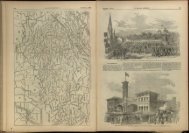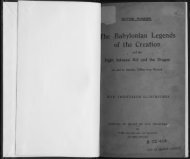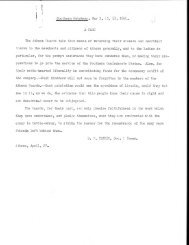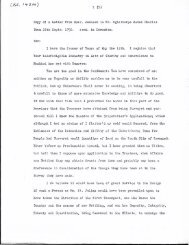THE SHE KING; OR, THE BOOK OF ANCIENT POETRY
THE SHE KING; OR, THE BOOK OF ANCIENT POETRY
THE SHE KING; OR, THE BOOK OF ANCIENT POETRY
Create successful ePaper yourself
Turn your PDF publications into a flip-book with our unique Google optimized e-Paper software.
264 <strong>THE</strong> <strong>BOOK</strong> <strong>OF</strong> POETET. [PAET II.<br />
himself, but drawing the picture of a lady whom he would rejoice to see<br />
as the bride of king Yew instead of the odious Paou Sze! With reason<br />
does Chow discard the authority of the Preface. The piece is a love<br />
eong, somewhat stately, but admirable in its way.<br />
1 With axle creaking, all on fire I went,<br />
To fetch my young and lovely bride.<br />
No thirst or hunger pangs my bosom rent,—<br />
I only longed to have her by my side.<br />
I feast with her, whose virtue fame had told,<br />
Nor need we friends our rapture to behold.<br />
2 The long-tailed pheasants surest covert find,<br />
Amid the forest on the plain.<br />
Here from my virtuous bride, of noble mind,<br />
And person tall, I wisdom gain.<br />
1 praise her while we feast, and to her say,<br />
" The love I bear you ne'er will know decay.<br />
3 " Poor we may be ; spirits and viands fine<br />
My humble means will not afford.<br />
But what we have, we'll taste and not repine;<br />
From us will come no grumbling word.<br />
And though to you no virtue I can add,<br />
Yet we will sing and dance, in spirit glad.<br />
4 " I oft ascend that lofty ridge with toil,<br />
And hew large branches from the oaks;<br />
Then of their leafy glory them I spoil,<br />
And faggots form with vigorous strokes.<br />
Returning tired, your matchless grace I see,<br />
And my whole soul dissolves in ecstasy.<br />
5 " To the high hills I looked, and urged each steed ;<br />
The great road next was smooth and plain.<br />
Up hill, o'er dale, I never slackened speed ;<br />
Like lute-string sounded every rein.<br />
I knew, my journey ended, I should come<br />
To you, sweet bride, the comfort of my home."<br />
The Ts'ing ying ; metaphorical and allusive.<br />
TO SLANDEHEKS.'<br />
V.<br />
AGAINST LISTENING<br />
<strong>THE</strong> <strong>BOOK</strong> OP POETET. 265<br />
Like the blue flies buzzing round,<br />
And on the fences lighting,<br />
Are the sons of slander found,<br />
Who never cease their biting.<br />
0 thou happy, courteous king,<br />
To the winds their slanders fling.<br />
2 Buzzing round the blue flies hear,<br />
About the jujubes flocking !<br />
So the slanderers appear,<br />
Whose calumnies are shocking.<br />
By no law or order bound,<br />
All the kingdom they confound.<br />
3 How they buzz, those odious flies,<br />
Upon the hazels clust'ring !<br />
And as odious are the lies<br />
Of those slanderers blast ring.<br />
Hatred stirred between us two<br />
Shows the evil they can do.<br />
VI.<br />
The Pin che tsoo yen ; narrative. AGAINST DRUNKENNESS. DRINK<br />
ING ACC<strong>OR</strong>DING TO RULE, AND DRIN<strong>KING</strong> TO EXCESS. A LIVELY<br />
PICTURE <strong>OF</strong> <strong>THE</strong> LICENSE <strong>OF</strong> <strong>THE</strong> TIMES.<br />
All the critics agree in thinking that the writer of the piece was duke<br />
Woo of Wei;—whose praises are sung in I. v. I. Han Ying adds that<br />
Woo made it, when repenting that he himself had fallen into the vice<br />
which he so graphically describes and strongly condemns.<br />
The general plan of the piece is plain enough. In stanzas 1 and 2 we<br />
have two instances of the temperate use of spirits, and in 3—5 we have<br />
the abuse of them on festive occasions. St. 1 is occupied with the<br />
moderate use of them at trials of archery before the king, when no li<br />
cense was indulged in ; st. 2 shows the same thing on occasions of sacri<br />
fice. The riotous feast in st. 3—5 was, probably, the entertainment given<br />
by the king to the princes of the same surname with himself at the con<br />
clusion of the seasonal sacrifices. We can conceive of such a scene taking<br />
place in the time of king Yew.<br />
There were various trials of skill in archery, of which the principal<br />
was that here referred to, before the king, and called "the great<br />
archer}'." It was preceded not by a heavy feast, but by a slight enter<br />
tainment. The shooting took place in the open court, beneath the hall<br />
where the entertainment took place. Three pairs were selected by the<br />
officers who had the direction of the trial. The others matched them-








